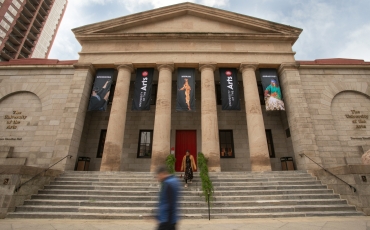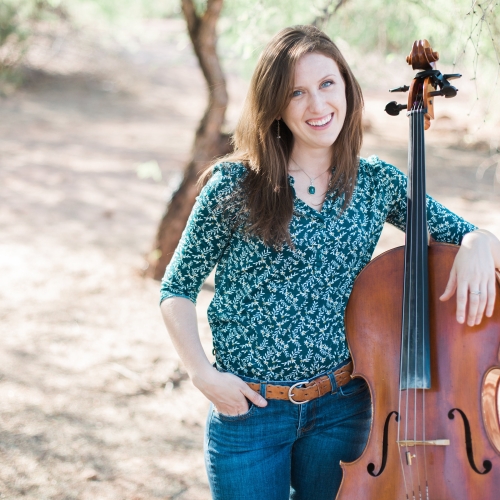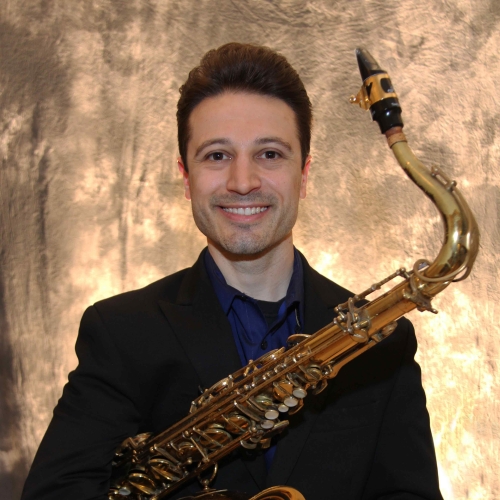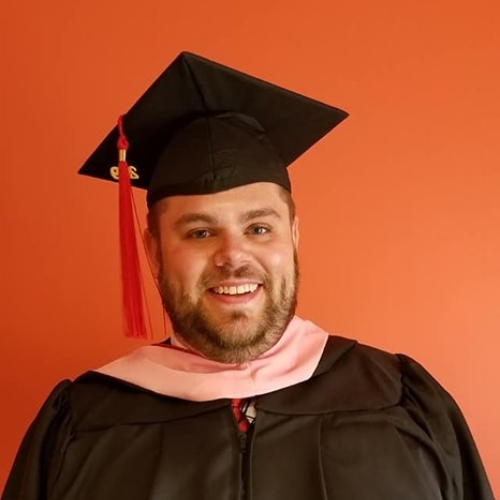
Music Education (MM)
The Master of Music in Music Education is a 33-credit program of study. The program is designed for music teachers desiring a Master of Music degree and others interested in studying music education at the graduate level. The degree can be completed in as few as three to four summers, but must be completed within seven years of matriculation. All coursework is offered in conjunction with the Summer Music Studies program. This course of study is a summer-only master’s degree.
This program does not lead to initial teaching certification in K–12 Music Education. All coursework counts toward PA, Level II certification advancement for music teachers with a current Level I certificate. The MM program is a PA Act 48 provider, and a NY CTLE provider.
New in 2024
UArts is now offering a 15-credit graduate certificate in Music Education! Practicing music educators can take courses through Summer Music Studies, and courses can count toward the MM in Music Education or be used as a post-master’s certificate. Credits can also be used for PA Act 48 and CTLU continuing education credits and Level II certification for the Pennsylvania Department of Education.
Curriculum
Program requirements: 33 credits
The curriculum consists of
- 12 credits of foundational coursework,
- 15 credits of elective coursework, and
- six credits of capstone project/thesis coursework and thesis submission.
Foundation courses provide the intellectual basis for music education as a professional praxis. You’ll deepen your knowledge and understanding of music and music education by studying the history of American music education, the sociological foundations of music in American education, and 21st century curriculum instruction and assessment strategies. Technology integration is the fourth foundation area of focus to meet the demands of teaching and learning
with 21st century educational tools and resources.
- Sociological Foundations of Music Education (3c)
- Curriculum and Assessment in Music Education (3c)
- Integration of Technology in Music Education (3c)
- Historical/Philosophical Foundations of Music Education (3c)
You can customize your education and pursue other areas of study related to your educational needs and interests through elective coursework. These courses are rooted in application-based learning environments, both pedagogical and methodological studies in all genres of music education and production. Courses are subject to change from summer to summer.
Elective course content topics include
- Alternative Ensembles
- Concert Band
- Conducting, Instrumental and Choral
- Drum Set
- General Music
- Guitar
- Instrument Repair, Band and Strings
- Jazz Band
- Music Technology
- Music Production
- Orff Certification, Levels 1, 2, 3
- Orff Supplemental Coursework
- Songwriting
- Strings and Orchestra
- Vocal/Choral
The graduate capstone project/thesis is the culmination of learning and professional growth established in the degree program. It demonstrates mastery of the course of study through a well-designed and developed capstone project/thesis. Your synthesis of knowledge and skills will be exemplified through an original, creative and thoughtful capstone project and written thesis.
Thesis/Project Development: Music Education will prepare you for the capstone project/thesis experience. You’ll develop the tools and knowledge to study and write a scholarly and research-based paper, addressing your topic of choice. You will choose Thesis: Music Education or Project: Music Education as the final course of the degree program. These courses are the capstone project/thesis submission courses that you’ll take during the semester you complete and submit your project/thesis. Note that you will choose between a traditional thesis and a capstone project/thesis as your final course.
- Thesis/Project Development: Music Education (3c)
- Thesis: Music Education (3c) or Project: Music Education (3c)
Explore the full curriculum.
Faculty
Contact Music Education Program Director Jenny Neff at jeneff@uarts.edu.
Alumni Spotlight
Tuition
Master of Music in Education students are required to pay course tuition and fees in full each semester. Graduate programs offered by the School of Professional Studies are not eligible for Federal Financial Student Aid. Please contact Student Financial Services to discuss options for alternative and/or private loans at (215)717-6170.
Course fees vary by class and are applied to specific operational costs incurred in certain classes, studios or labs. Payment of fees assigned to courses is nonrefundable. Students are responsible for obtaining their own course materials and supplies. Supply lists specific to each class are included in the syllabi posted online at least one week prior to class.
Academic Year 2024–2025
-
Tuition: $783 per credit / $2,349 for a 3-credit course
-
Fees: Varies by course, typically $50–$100
Sample Course Plans
Sample course plan as a matriculated student
| Summer 1 | two foundation courses and two elective courses | 12 credits | $9,396* |
| Summer 2 | one foundation course, Thesis/Project Development: Music Education, and one elective course | 9 credits | $7,047* |
| Summer 3 | one foundation course and two elective courses | 9 credits | $7,047* |
| Any semester | Thesis: Music Education or Project: Music Education | 3 credits | $2,349* |
Sample course plan starting as a non-matriculated student and transferring into the degree program
| Any semester | two elective courses as a non-matriculated student | 6 credits | $2100** |
| January–April | Apply to the MM program. After acceptance, transfer two elective courses. | ||
| Summer 1 | two foundation courses and one elective course | 9 credits | $7,047* |
| Summer 2 | one foundation course, Thesis/Project Development: Music Education, and one elective course | 9 credits | $7,047* |
| Summer 3 | one elective course and one foundation course | 6 credits | $4,698* |
| Any semester | Thesis: Music Education or Project: Music Education | 3 credits | $2,349* |
*Based on $783 per credit (MM rate)
**Based on $350 per credit (non-matriculated rate)
How to Apply
Application Deadline
Summer 2024 Priority Deadline: Applications received by February 1 will be among the first considered for admission. We will not accept any applications or materials after May 12.
Application Requirements
-
$60 nonrefundable application fee
-
If the cost of the application fee is a barrier, contact Admissions to request a fee waiver code.
-
-
Official undergraduate transcript
-
Official transcripts must be sent directly from the college where you have earned, or will earn, your undergraduate degree by mail, email or a secure electronic document-delivery service.
-
If you have earned, or will earn, your undergraduate degree outside the U.S., see our transcript requirements for international graduate applicants below.
-
-
Two letters of recommendation
-
Two letters of recommendation from professors or professionals in your field, who are familiar with your capabilities, are required. In the case that these recommenders are not available, you may request letters from colleagues, collaborators or peers, if necessary.
-
Applicants must enter contact information for their recommenders on the application. An email will be sent to recommenders providing a link for them to upload their letter. Letters of recommendation may also be submitted by the recommender via email to gradcredentials@uarts.edu.
-
-
Statement of intent
-
Statements should be a minimum of one to two pages and detail your professional plans, interests and goals. What do you hope to gain by your studies at the graduate level?
-
Your statement of intent may be uploaded during the application process or added after submission via your applicant status portal.
-
-
Résumé
-
Your résumé should highlight all your professional accomplishments, including employment, internships, honors, performances and publications or projects.
-
Your résumé may be uploaded during the application process or added after submission via your applicant status portal.
-
International Applicants
In addition to the requirements listed above, international applicants or those with foreign credentials must submit
-
Official undergraduate transcripts
-
Applicants who have academic documents from institutions outside the U.S. are required to provide original, attested or certified true copies of academic records from the institution where they have earned, or will earn, their undergraduate degree. These records should be in the original language in which they were issued.
-
For postsecondary school records that are not in English, applicants must also submit an official translation of all their academic documents. Translations must be a complete, literal, word-for-word translation in the same format of the original academic document. Transcripts cannot be translated by the student or any members of their family. Acceptable translators include English teachers or other school officials, professional translators, or a local EducationUSA office.
-
Admissions might request that students obtain a course-by-course credential evaluation if we are not able to confirm the equivalent level to a U.S. undergraduate degree.
-
-
Proof of English proficiency
-
For international applicants whose primary language is not English, and who have not completed two semesters of college-level English in a college/university where the language of instruction is English, proof of English proficiency is required.
-
Recommended minimums for English proficiency exams are as follows.
- TOEFL iBT: 79
- TOEFL essentials: 8.5
- IELTS: 6.5
- Pearson PTE Academic: 53
- Duolingo: 100
-
Applicants who meet the academic and creative requirements for admission but whose scores do not meet the English proficiency requirement for degree study might receive an offer of conditional admission that requires enrollment in the university’s English as a Second Language Institute (ESLI). Applicants who successfully complete ESLI will then be able to begin their degree program studies in the fall semester.
-
In special circumstances, applicants who do not have access to the TOEFL, IELTS or Duolingo English tests can request a waiver of this requirement. The request should be submitted by email to admissions@uarts.edu. Requests will then be reviewed on a case-by-case basis and might require an interview.
-
-
I-20/F-1 international student visa information: Upon acceptance, students will be contacted by University of the Arts’ International Student Programs office, regarding visa counseling and all materials required to create an I-20 in order to obtain an F-1 visa. Contact Mara Flamm, director of international student programs, with any questions regarding your I-20 or F-1 visa.
Get Started

Start your application
Begin your application today. Our admissions team will help you throughout the process.

See UArts for yourself
The best way to get to know UArts is by visiting our campus in person. Come see a show, visit a gallery, and get to know the neighborhood.

Not sure where to start?
We're glad you want to learn more. Our admissions team is happy to send additional information about our school.















